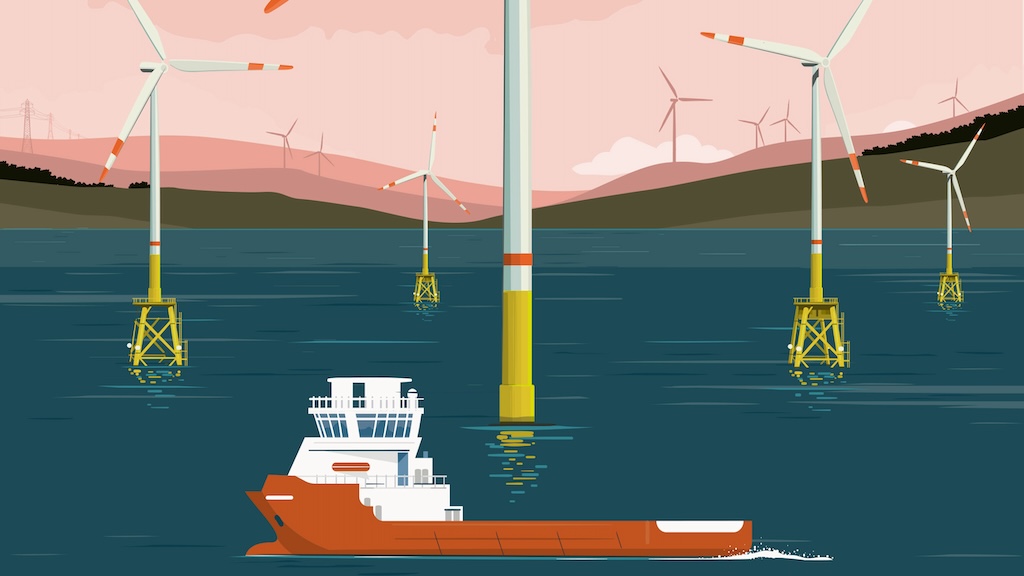GB Energy: What role will Labour's state-owned energy company really play?
Illustration by Tracy Worrall
10 min read
Labour’s pledge to create a state-owned energy company is key to its 2030 clean power target – yet has received little attention so far. Sienna Rodgers gets to the bottom of the GB Energy policy
After a painfully protracted will-they-won’t-they, Labour recently – at last – dropped the £28bn price tag on its “green prosperity plan”. And yet, in what is perhaps the party’s most ambitious policy, Labour is still promising to deliver 100 per cent clean energy by 2030, five years earlier than the government target. At the centre of that commitment is Great British Energy.
GB Energy is a new state-owned renewable energy company that Labour has pledged to set up in its first year of government. The idea originally came from Common Wealth, a think tank that promotes public ownership, the launch of which was backed in 2019 by Ed Miliband alongside John McDonnell and Caroline Lucas.
“This could be a really useful vehicle for not just decarbonising but democratising the energy system if we get it right. But getting it right will require scale”
Labour has claimed GB Energy will: cut energy bills, saving households £93bn; create hundreds of thousands of jobs; help decarbonise UK power by 2030; and deliver security by making the United Kingdom energy independent.
It’s a tall order – and most of the sources who spoke to The House for this article said the party had not made it clear how GB Energy would operate and thereby achieve these goals. “GB Energy is still very, very poorly defined,” one industry voice notes. “It’s not clear to me what Great British Energy actually is going to do or how it’s going to do it,” one Labour MP says.
The Common Wealth model for a public renewable energy company is one that generates power itself, both owning and operating state-owned generating assets such as wind farms. Amid talk of GB Energy being an “EDF-style” outfit, the TUC conducted analysis last year that found it would need around £61bn to £82bn of investment between 2025 and 2035 to scale up accordingly. Labour has only committed to an initial £8.3bn capitalisation over the course of the first parliament.
Mathew Lawrence, director of Common Wealth, agrees with the TUC that scale is key to making the project work. “This could be a really useful vehicle for not just decarbonising but democratising the energy system if we get it right. But getting it right will require scale. The benefits of scale outweigh caution,” he says.
Yet some sources in the sector say they have understood from conversations with Labour that GB Energy will be a vehicle for driving investment and de-risking new technologies and finance – not an energy generator competing for bids against other renewable developers.
“Labour understands that what we’ve seen over the last year, especially with the gas crisis, has been quite damaging to the industry,” says Jess Ralston, an energy analyst at the Energy and Climate Intelligence Unit. “They don’t want to get into a situation where competition is being undermined because the government can bid in much cheaper than everyone else.”
What, then, is the truth about Labour’s GB Energy plans? Miliband tells The House that the aim is for GB Energy to have two primary functions: first, as a driving investor in new technologies, particularly floating offshore wind, via partnerships with the private sector; and second, called the “local power plan”, as a way of giving communities a stake and ownership in renewable energy via partnerships with local authorities and the private sector.
Will GB Energy ever look like the Common Wealth model of a state-owned company building, owning and operating sole energy projects of its own? Maybe. It is the party’s long-term ambition to reach this point, but that depends on its ability to scale up the company. Labour first intends to test the theory that government can unlock more capacity by partnering with the private sector.
 Illustration by Tracy Worrall
Illustration by Tracy Worrall
“Obviously we’re going to be starting it from scratch in government, so it’s going to take time to develop to the comprehensive long-term version, for it to become an Ørsted. It’s not going to become an Ørsted overnight,” Miliband says, referring to the largest energy company in Denmark, in which the Danish government holds a majority of shares.
Asked how Labour would turn GB Energy into a viable business quickly, for example by headhunting Ørsted figures for the board, Miliband replies: “We’re determined to get the best and the brightest as part of this. That’s obviously something you need to go through the proper processes in government to do it. But one of the things we’re working on at the moment is to make sure we can get GB Energy up and running as soon as we get into government.
“It will probably require legislation to formally put it into place. We hope that will be early legislation as part of our Energy Independence Act. But we’re doing the plans in advance of government, if we win the election, so we are able – in particular around this local power plan stuff – to hit the ground running.” Trade unions, he adds, “will have an important role in relation to the board of GB Energy”.
Despite promised trade union involvement, the reality of GB Energy is disappointing to some who were pushing for more radical proposals. Labour for a Green New Deal, a campaign group associated with the Labour left, is in favour of nationalising existing assets – but one of the key advantages of the GB Energy policy from the party leadership’s perspective is that the new company involves no nationalisation and none of the difficult politics around making the case for that.
Critics from the left accuse Labour of settling on a compromise – at least for now – that encompasses “the worst of both worlds”: the state takes the risk of unproven technologies while the private sector continues to extract the surplus from proven existing technologies that guarantee a return.
“Using GBE to ‘de-risk’ or ‘crowd-in’ private sector investment will mean handing over more money to energy companies whilst we pay for it if it goes wrong,” says Alex Stephenson, energy campaigner for Labour for a Green New Deal.
Common Wealth similarly argues that Labour’s approach is flawed if GB Energy only invests in emerging technologies. “In some ways it’s the state again doing all the heavy lifting of frontier technological change, and all the risks involved, but what we really need to do is scale rapidly proven technologies to more rapidly decarbonise, cut energy bills and deliver energy security,” says Lawrence.
“It plays into all their themes of energy security, securonomics and patriotism”
On the opposite side of the debate is the industry, which wants the next government to focus on eliminating barriers that private companies are struggling to overcome.
“The story of decarbonisation is electrification. We need to electrify everything we can,” one industry figure says. “If GBE is enabling new infrastructure to be built or grid connections to be made, honestly, we’ll bite their arm off. If it’s busy on the same projects as the private sector, that’s wasteful crowding out.”
Those in the renewable energy industry point out that the UK is already able to generate so much wind power that, on windy days, huge amounts of money are spent turning off Scottish farms – simply because the grid is not up to the job. The cost amounts to £1bn a year, according to a recent Policy Exchange report. Renewable energy generation, the industry says, is not the problem.
“The key for state involvement is to address market failures,” says Greg Jackson, founder and chief executive of Octopus Energy. “This includes situations where there’s simply not the data for private investors to assess risk and return, such as ultra-long duration storage or tidal power; new technologies which need help to scale, such as floating wind; or delivering a just transition by closing down the gas network whilst enabling workers to benefit from the emergence of the clean energy system.”
 Illustration by Tracy Worrall
Illustration by Tracy Worrall
When this is put to defenders of GB Energy, they highlight that in a government auction last year there were no bids by developers for new offshore wind farms. While the firms say the costs were too high and the price set by government too low for these contracts, Labour believes this example shows the state should not leave generation up to chance.
Much of the motivation for creating GB Energy is based on the fact that a shockingly low 0.03 per cent of the UK’s offshore wind is owned by UK public entities. Instead, foreign public entities such as Denmark’s Ørsted and Norway’s Equinor dominate in UK offshore waters. Miliband sums up the Conservative position as “we’re in favour of public ownership, just not British public ownership”. So, Labour asks: why should profits go to their taxpayers rather than ours?
Conservatives are not immediately dismissive of GB Energy – depending on what it does exactly. “It’s not a bad idea,” says one Tory MP, who goes on to explain that they are, of course, against nationalised green energy production, but would favour GB Energy as a delivery mechanism for grants to stimulate innovation.
Labour sources argue that Great British Nuclear – the state-owned nuclear energy company resurrected by the current government last year to help deliver 24 GW of nuclear power in the UK by 2050 – shows the Conservatives accept the principle behind GB Energy.
“GBE has the potential – if backed overtime by large-scale investment to develop home grown power – to be transformative”
Some may wonder whether GB Energy won’t simply be dropped altogether, following the same path as the £28bn. But sources from all sides agree this is highly unlikely.
Starmer is said to be a fan of the policy because it is so popular with voters – in February polling by YouGov, 66 per cent of Brits supported it and just six per cent opposed – and it feeds neatly into a “take back control of our energy system” narrative. “It plays into all their themes of energy security, securonomics and patriotism,” says one source familiar with Labour’s thinking. “They won’t drop it altogether. It’s so market-friendly,” adds a source who is critical of the plans in their current form.
It is not signed-off policy so far, but The House understands that Labour is considering signs that read “made with GB Energy investment” being placed on its projects, similar to European Union funding logos. The party wants the company to have high visibility with voters.
Labour reckons the idea appeals to everyone in the party from John McDonnell as shadow chancellor and Peter Mandelson as business secretary. Yet, when GB Energy makes contact with reality, it is clear the party cannot please everyone.
“GBE has the potential – if backed over time by large-scale investment to develop home grown power – to be transformative,” says Lawrence. Common Wealth ultimately favours a publicly owned energy system, and that is not GB Energy’s goal. And yet, the think tank director adds, “it gets you on the pitch”.
It seems likely that those who would prefer the company prioritises partnership with the private sector will be the happier camp during the first term of a Labour government. How GB Energy lands with stakeholders in the longer term, however, is less certain.
